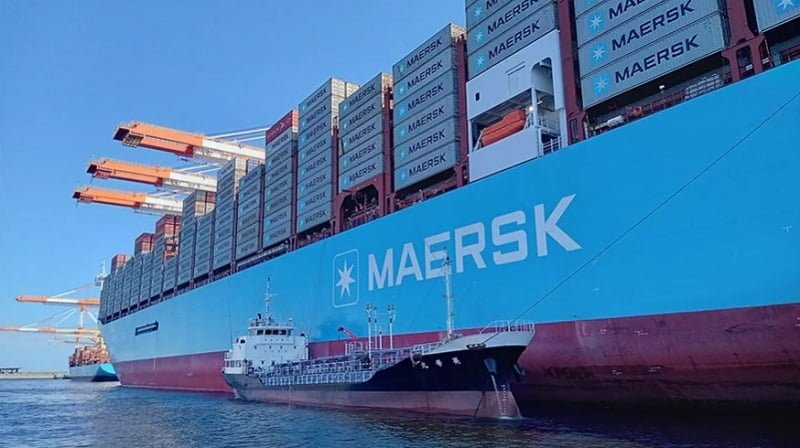In a major step towards advancing methanol bunkering infrastructure in Japan, A.P. Moller – Maersk (Maersk) has co-hosted Japan’s first-ever “methanol bunkering simulation” at the Port of Yokohama. This landmark initiative is part of the company’s ongoing efforts to support the development of methanol fuel bunkering for sustainable maritime transport.
The simulation featured Maersk’s fifth dual-fuel methanol vessel, the Alette Maersk, which was recently christened in Los Angeles in August. The operation was conducted in collaboration with Kokuka Sangyo’s methanol tanker, Eikamaru, and was designed to test essential bunkering processes, including berthing, unberthing, and hose connections, crucial for methanol fueling operations.
Table of Contents
Laying the Groundwork for Future Methanol Bunkering in Japan
Japan is in the early stages of developing its methanol fuel bunkering guidelines, and the insights gained from this simulation will play a critical role in establishing best practices for future methanol fueling operations. The event represents a significant milestone in Japan’s journey towards developing robust methanol bunkering infrastructure.
The simulation builds on Maersk’s Memorandum of Understanding (MoU) signed earlier this year with the City of Yokohama and Mitsubishi Gas Chemical. The MoU outlines the parties’ commitment to developing methanol bunkering capabilities in Yokohama, with the collaboration receiving support from additional stakeholders, including Japan’s Ministry of Land, Infrastructure, Transport, and Tourism (MLIT) through its Port and Harbor Bureau.
Support from Key Stakeholders
During the event, NAKAGAWA Kenzo, Director of the Industrial Port Policy Division at the Ports and Harbors Bureau, expressed his gratitude to all parties involved in Japan’s first methanol bunkering simulation. He emphasized the importance of establishing methanol bunkering hubs in Japan’s ports, stating that the country’s Ports and Harbors Bureau is planning to convene a study group to explore this vital development.
“Establishing methanol bunkering hubs in our ports is vital, and we will accelerate discussions, leveraging the insights from this simulation,” Nakagawa remarked.
Yasuhiro Shimbo, Director General of the Port and Harbor Bureau in the City of Yokohama, also acknowledged Maersk’s contribution to facilitating the simulation on the Alette Maersk. He reiterated Yokohama’s commitment to building methanol bunkering capabilities and contributing to the decarbonization of Japanese and global shipping.
Masahiko Naito, Division Director of Mitsubishi Gas Chemical’s C1 Chemicals Division, hailed the simulation as a major step toward implementing methanol bunkering and achieving carbon neutrality in Japan. He highlighted the importance of today’s collaborative efforts as the country moves closer to introducing methanol as a sustainable marine fuel.
Maersk’s Role in Supporting Decarbonization
Toru Nishiyama, Managing Director for Northeast Asia at Maersk, expressed the company’s commitment to supporting Japan’s ambition to decarbonize its shipping and energy sectors. He underscored Maersk’s dedication to driving lower-emission practices in the industry and emphasized the importance of collaboration with partners to accelerate the adoption of cleaner fuels like methanol.
“It is an honor to participate in the very first simulation of methanol bunkering in Japan. Maersk is committed to a decarbonized future, and it is our great pleasure to support Japan’s ambition in decarbonizing the shipping and energy sectors,” Nishiyama stated.
This simulation not only demonstrates the potential of methanol as a viable marine fuel but also underscores Maersk’s leadership in fostering innovative solutions for sustainable shipping.
Japan’s Plans for Methanol Bunkering Hubs
The Ports and Harbors Bureau of MLIT has outlined plans to accelerate the development of methanol bunkering hubs across Japan. The bureau’s study group will explore the opportunities and challenges of integrating methanol bunkering into Japan’s port infrastructure, informed by the outcomes of this simulation.
About Maersk
A.P. Moller – Maersk is a global leader in integrated logistics, dedicated to connecting and simplifying its customers’ supply chains. The company operates in more than 130 countries and employs around 100,000 people. With a strong commitment to sustainability, Maersk is targeting net zero emissions by 2040, leveraging new technologies, next-generation vessels, and low-emission fuels to transform the future of shipping.
Source A.P. Moller – Maersk

